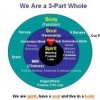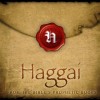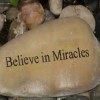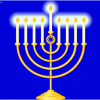| << Previous 1 - 2 - 3 - 4 - 5 - 6 - 7 Next >> |
Exodus 3:14 “God said to Moses, “Ehyeh asher Ehyeh.” And he said, “Say this to the people of Israel, ‘Ehyeh has sent me to you.’ ”
As a Judeo-Christian Pastor, I find that my understanding of God is constantly evolving … my theology is NOT static but it is always evolving to a different level. However, in my pastoral ministry I have found that some people interpret Scriptures through their personal worldview and tend to put God in their personal boxes. The problem with these boxes is that God is always outside the box!!! Just ask Abraham, Job, Noah, Peter, Paul, the early church fathers, or any of your local pastors who love and serve the Lord and their communities!!!
Precious one, our God cannot be predicted or controlled. He cannot be confined to categories or predicted in advance. However, this “un-confinable” God wants us to know Him (Eph.1:16-21). But how do we relate to an unpredictable yet faithful-relational God who cannot be confined to categories or predicted in advance? The answer lies in the "FUTURE TENSE" that is anchored in the Holy Spirit's who calls us to walk in faith in the hope of that which is “NOT-YET” (Hebrews 11:8).
Let me explain this statement with an example from the life of Moses…
When Moses encounters God at the burning bush, God calls Moses to lead the Israelites out of Egypt, but Moses is reluctant. ‘Who am I,’ he asks, ‘to be worthy of such a task?’ God reassures him, and then Moses asks, ‘Who are you? When the Israelites ask, who has sent you, what shall I say?’ God replies in a cryptic three-word Hebrew phrase, Ehyeh asher ehyeh (Exod. 3: 14).
Jewish Rabbis are surprised to see how Christian Bibles have mistranslated this clause. The King James Version reads Ehyeh asher ehyeh (Exod. 3: 14) as ‘I am that I am.’ Recent translations are variants of the same idea. Here are some examples:
I am who I am.
I am what I am.
I am— that is who I am.
These are all MISTRANSLATIONS, and the error is ancient.
In Greek, Ehyeh asher ehyeh became ego eimi ho on, and in Latin, ego sum qui sum: ‘I am he who is.’ Augustine in the Confessions writes: ‘Because he is Is, that is to say, God is being itself, ipsum esse, in its most absolute and full sense.’ Centuries later, Aquinas explains that it means God is ‘true being, that is being that is eternal, immutable, simple, self-sufficient, and the cause and principle of every creature’. And so it continued in German philosophy. God became Hegel’s ‘concrete universal’, Schelling’s ‘transcendental ego’, Gilson’s ‘God-is-Being’ and Heidegger’s ‘onto-theology’.
Rabbi Jonathan Sacks, the Chief Rabbi of the United Kingdom points out that the mistake of all these translations is obvious to the merest beginner in Hebrew. The phrase means, ‘I will be what I will be.’ The verb does not use the present tense, but it uses the FUTURE TENSE.
Elsewhere, the Bible does use the present tense when it relates to God. In the Ten Commandments, for example, the first verse reads, ‘I am the Lord your God who brought you out of Egypt, out of the land of slavery.’ Here the present tense (‘I am’) is used. But then, that verse does not speak of God’s name. It speaks of His deeds. However in Exodus 3:14, Moses asked God for His name. God could have replied, as did the angel who wrestled with Jacob, with a rhetorical question, ‘Why do you ask for my name?’ implying that the very question is out of order. There are things human beings cannot know, mysteries they cannot fathom, and matters that transcend the reach of human understanding. But that is not what God says. He does answer Moses’ question, but enigmatically, in a phrase that needs decoding. God tells Moses to say to the Israelites, ‘“I will be” sent me to you. It is as if God had said, ‘My name is the future tense. If you seek to understand me, first you will have to understand the nature and significance of the future tense.’
‘I am that I am’ is a translation that owes everything to the philosophical tradition of ancient Greece and nothing to the thought of ancient Israel. The God of pure being, first cause, prime mover, necessary existence, is the god of the philosophers, not the God of the prophets in the Bible.
What, then, is the meaning of ‘I will be what I will be’? The name itself never recurs in the Hebrew Bible, but there is a later echo, in the great scene in which God appears to Moses on the mountain after the sin of the Golden Calf, in which he says, ‘I will have mercy on whom I will have mercy, and I will have compassion on whom I will have compassion’ (Exodus 33: 19). What this means is that God cannot be predicted or controlled. He cannot be confined to categories or known in advance. God is telling Moses, ‘You cannot know how I will appear until I appear; how I will act until I act. My mercy, my compassion, my strategic interventions into history, cannot be controlled or foretold. I will be what, when and how I choose to be. I am the God of the radically unknowable future, the God of surprises. You will know me when you see me, but not before.’
To be sure, in one sense, the future is connected to the past. God keeps His promises. That is an essential element of Judeo-Christian faith. God’s name tells us that He is not an entity knowable by philosophy or science, deducible from the past. God awaits us in the unknown and unknowable future: the God of Israel is the God of the future tense. So just like Abraham our faith is the courage to live with uncertainty of the present world, and walk toward the unknowable future knowing that God will meet us in the place to which He has called us to go (Hebrews 11:8). This journey of faith depends upon hearing the Voice of God in-Christ (Deut.6:4; John 10:27) from the Scriptures through the Holy Spirit. The organ of faith is the ear, NOT the eye. So, we walk by faith and NOT by sight… therefore, lets not put Him in a Box that comes from the world we see and know (worldview)… we will NOT be able to figure Him out because He is much GREATER than our box…Isaiah 55:8-9 “For my thoughts are not your thoughts, neither are your ways my ways, declares the Lord. For as the heavens are higher than the earth, so are my ways higher than your ways and my thoughts than your thoughts.”
God waits for you in the unknown and unknowable future: ‘You cannot know how He will appear until He appears; how He will act until He acts. His mercy, His compassion, His strategic interventions into history, cannot be controlled or foretold. He will be what, when and how He chooses to be. He is the God of the radically unknowable future, the God of surprises. You will know Him when you see Him, but not before!’
So, please don't put God in your box...come out of your box and meet Him...He is there waiting for you :-)
References:
Future Tense: Jews, Judaism, and Israel in the Twenty-first Century (p. 234). Random House, Inc. Jonathan Sacks

The Gift of Motherhood: A Message from Leviticus 12 on Mother’s Day 2013
by Pastor Moh | May 13, 2013
The Gift of Motherhood:
A Message from Leviticus 12 on Mother’s Day 2013
“And when the days of her purifying are completed, whether for a son or for a daughter, she shall bring to the priest at the entrance of the tent of meeting a lamb a year old for a burnt offering, and a pigeon or a turtledove for a sin offering…” Leviticus 12:6
God has always revealed Himself to humankind through His Word - the Bible, and His Word became flesh in “Jesus Christ” to reveal Himself fully to humankind. True Christianity is about the Lord Jesus who is the descent of God into the middle of our muddled lives, just as they are, not the ascent of our lives to God, hoping that he might approve when He sees how hard we try. God's involvement in our lives is not limited to history. Jesus Christ - is EMMANUEL - God with us NOW - not just in the past or somewhere out in the future BUT right NOW and FOREVER! Hence, the Word of God - the Bible, shows us that the commitment that God is looking for from humanity is NOT to escape this life but to know God's power and presence in the here and now, which could transform both our lives and our society.
The Book of Leviticus in the Bible contain laws which are among the most difficult to understand. Some of them deal with conditions of “impurity” arising from the fact that we are spiritual-physical beings exposed to physical conditions and changes in our earthly environment. Throughout history there have been two distinct and opposing ways of relating to our spiritual reality: hedonism (living for physical pleasure) and asceticism (relinquishing physical pleasure). The hedonism worships the physical while denying the spiritual while asceticism enthrones the spiritual at the cost of the physical. True Judeo-Christian way has always been different: to sanctify the physical – eating, drinking, sex and rest – making the life of the body a vehicle for the divine presence. The reason is simple. We believe with perfect faith that the God of redemption is also the God of creation. The physical world we inhabit is the one God made and pronounced “very good.” To be a hedonist is to deny God. To be an ascetic is to deny the goodness of God’s world. To be a Judeo-Christian is to celebrate both creation and Creator. That is the principle that explains many otherwise incomprehensible features of Judeo-Christian life.
The laws of childbirth purification in Israel are striking examples of this fact:
When a woman conceives and gives birth to a boy, she shall be teme’ah for seven days, just as she is during the time of separation when she has her period . . . Then, for thirty-three additional days she shall have a waiting period during which her blood is ritually clean. Until this purification period is complete, she shall not touch anything holy and shall not enter the sanctuary.
If she gives birth to a girl, she shall have for two weeks the same teme’ah status as during her menstrual period. Then, for sixty-six days after that, she shall have a waiting period during which her blood is ritually clean. She then brings a burnt-offering and a sin-offering, after which she is restored to “ritual purity.”
What is the meaning of these laws?
Why does childbirth render the mother teme’ah (usually translated as “ritually impure”, better understood as “a condition which impedes or exempts from a direct encounter with holiness”)?
And why is the period after giving birth to a girl twice that for a boy?
There is a temptation to see these laws as inherently beyond the reach of human understanding. Several Rabbinic and Christian statements seem to say just this. In fact, it is not so, as the great Rabbi Maimonides explains at length in the “Guide to the Perplexed.”
The first principle essential to understanding the laws of ritual purity and impurity is that God is life, and He honors LIFE. Christianity and Judaism are a profound rejection of cults, ancient and modern, that glorify death. It is a protest against death-centered cultures. “It is not the dead who praise the Lord, nor those who go down into silence” (Psalm 114) “What profit is there in my death, if I go down into the pit? Can the dust acknowledge You? Can it proclaim your truth?” (Psalm 30). As Moses put it in two memorable words: “Choose life” (Deut. 30: 19).
In Leviticus 12, the Lord shows great sensitivity to the birth of a child. Nothing is more “natural” than procreation. Every living thing engages in it. Sociobiology go so far as to argue that a human being is a gene’s way of creating another gene. By contrast, the Torah goes to great lengths to describe how many of the heroines of the Bible – among them Sarah, Rebecca, Rachel, Hannah and the Shunamite woman – were infertile and had children only through a miracle.
Clearly the Torah intends a message here, and it is unmistakable. To be a believer is to know that survival is not a matter of biology alone. What other cultures may take as natural is for us a miracle. Every child is a gift of God. The Bible is very serious about the issue of building up the next generation. Childbirth is wondrous. To be a parent is the closest any of us come to God Himself. That, incidentally, is why women are closer to God than men, because they, unlike men, know what it is to bring new life out of their bodies, as God brings life out of Himself. The idea is beautifully captured in the verse in which, leaving Eden, Adam turns to his wife and calls her Chavah “for she is the mother of all life.”
We can now speculate about the laws relating to childbirth. When a mother gives birth, not only does she undergo great risk (until recently, childbirth was a life-threatening danger to mother and baby alike). She is also separated from what until now had been part of her own body (a fetus, said the rabbis, “is like a limb of the mother”) and which has now become an independent person. If that is so in the case of a boy, it is doubly so in the case of a girl – who, with God’s help, will not merely live but may herself in later years become a source of new life. At one level, therefore, the laws signal the detachment of life from life.
In Leviticus 12 God is sayingto the mother: for forty days in the case of a boy, and doubly so in the case of a girl (the mother-daughter bond is ontologically stronger than that between mother and son), I exempt you from coming before Me in the place of holiness because you are fully engaged in one of the holiest acts of all, nurturing and caring for your child. Unlike others you do not need to visit the Temple to be attached to life in its entire sacred splendor. You are experiencing it yourself, directly and with every fiber of your being. Days, weeks, from now you will come and give thanks before Me (together with offerings for having come through a moment of danger). But for now, look upon your child with wonder. For you have been given a glimpse of the great secret, otherwise known only to God.
Childbirth exempts the new mother from attendance at the Temple because her bedside replicates the experience of the Temple. She now knows what it is for love to beget life and in the midst of mortality to be touched by an intimation of immortality.
References:
The Message Bible by Eugene Peterson
COVENANT & CONVERSATION: Tazria-Metsorah – Holiness and Childbirth by Rabbi Jonathan Sacks
DISCERNING THE DIFFERENCE BETWEEN SPIRIT, SOUL, AND BODY
Gen 2:7: (KJV) “And the LORD God formed (“yastar” - Hebrew) man of the dust of the ground, and breathed into his nostrils the breath of life; and man became a living soul.”
Most people have a difficult time understanding the difference between their soul and their spirit. So, to my family at TSH, I would like to give a Biblical answer so that you may know the truth and live into the truth as the Holy Spirit lives through you, and guides your life!
In Genesis 1-2, on the sixth and final day of creation, God created all the animals, and then He created humankind. Even though man was an entirely different species from any other living creature, his body was formed from the dust of the earth just as the animals body was formed from the dust of the earth (Genesis 2:7). However, there were major differences between man and the other animals, the primary one being that man was made in God’s image in spirit, and given a soul and body.
Genesis 2:7 - “God formed man out of dust of the ground, and breathed into his nostrils the breath of life, and man became a living creature,” as “and man became “ruaĥ memallelah” (in Hebrew), which means “a speaking spirit.” Because we can think and speak, we can imagine a world different from the one that currently exists. Hence,
1. With his spirit Adam communed and shared his life with God in unbroken fellowship.
2. With his soul, Adam had the awesome intellect to operate the Earth as its overseer. He possessed emotions to admire the sunrise and the sunset, and to feel affection toward his wife. He had the willpower to choose what he would do as he walked on the Earth as its king.
3. With his body, Adam was able to experience the living reality of our physical universe with his God-given five senses (see, hear, feel, smell & taste).
As long as Adam lived by his spirit in communion with God, and was led by the spirit in communion with God, he had perfect fellowship with God, with his environment, and with himself. He was a whole person, well adjusted and supremely happy. Hence, the Bible makes a clear distinction between our soul and our spirit. The Word not only distinguishes a person's spirit from his or her soul, but it also teaches us the difference between them:
· The Lord Jesus states in Mark 12:28-31 that we must love God with our soul: “One of the teachers of the law came and heard them debating. Noticing that Jesus had given them a good answer, he asked him, “Of all the commandments, which is the most important?” The most important one,” answered Jesus, “is this: ‘Hear, O Israel: The Lord our God, the Lord is one Love the Lord your God with all your heart and with all your soul, and with all your mind, and with all your strength.’ The second is this: ‘Love your neighbor as yourself.’ There is no commandment greater than these.”
· In 1 Thessalonians 5:23, Paul prayed for the Thessalonians: "Now may the God of peace Himself sanctify you completely; and may your whole spirit, soul, and body be preserved blameless at the coming of our Lord Jesus Christ."
· Hebrews 4:12 states, "For the word of God is living and powerful, and sharper than any two-edged sword, piercing even to the division of soul and spirit, and of joints and marrow, and is a discerner of the thoughts and intents of the heart."
· In Luke 1:46-47, after Elizabeth had greeted her and confirmed her having conceived the Messiah, Mary sang, "My soul magnifies the Lord, and my spirit has rejoiced in God my Savior."

1. At the core, we have a spirit. It is the relational, worshipful, living center of the human personality, connected to God by Christ in the Holy Spirit.
2. Surrounding the spirit, we have a soul. It is the command center of the human personality, which includes intellect, emotions, and will.
3. Supporting and supported by both spirit and soul, each of us has a body.
Your soul, the DECISION-MAKER, determines what of your new life will be… it sits in the driver's seat…. If the soul is unhealthy in any way by reason of past habits, pains, or needed repairs, your whole body, mind and soul will be unhealthy and painful.
At the seat of your identity and will, your soul functions as the command center. What goes on in your soul determines the extent to which the Lord’s WORD and WAY manifest in the whole of your being. If there is brokenness or sickness in your soul, it may NOT mean your damnation, but it will cause bad sinful behaviors in your daily life – a life of sin and bad habits!
Your soul includes three essential facets and functions. These comprise your essential personality:
1. Your intellect-the processes of your intelligence, your mind, your thoughts
2. Your emotions-the processes of your temperament, your feelings, your attitudes
3. Your will-the processes of your choice, your determination, your decisions
Most of what lures, drives, attracts, convinces, persuades, or motivates you is generated at the thought (intellect) or feeling (emotions) level. The health of your souls determines your overall spiritual formation and mental health. The human will is the most awesome feature of your soul and of your whole being. Your will determines your destiny. By reason of your will, your soul functions as the command center for your whole personality. What goes on in your soul determines how you feel today (your emotions). What goes on in your soul determines if you will learn today (with your intellect) those lessons you must know to grow in the understanding of the Lord, obey Him and make the necessary changes (Romans 12:1-2).
Daily decisions determine which feelings you need to respond to or reject in order to obey the will of God, and which attitudes or facts you need to process in your mind according to the Holy Spirit's directives. All of this is going on today in your soul. How your mind and emotions interact generate decisions will either deepen your problems or release your progress-in-Christ...It is essential for your soul to be restored (Psalm 23:3). Your re-born spirit may make it possible for you to worship God, but your rebuilt soul will determine your freedom in life, your service for Christ to others, your fulfillment, peace, and joy.
3 John 1:2 “Beloved, I pray that you may prosper in all things and be in health, just as your soul prospers.”
Reference:
- Jack Hayford. Rebuilding the Real You: The Definitive Guide to the Holy Spirit's Work in Your Life. Kindle Edition.
- http://www.cleansingstream-australia.org/pdfs/THE_FINGER_OF_GOD.pdf
Our Daily Work – Vessels of Blessing
“The Lord God took the man and put him in the Garden of Eden to WORK it and KEEP it.”
(Genesis 2:15)
This weekend (April-14/15-2013) marks the one year anniversary of my father’s passing onto heaven. This week I am reminded of the fact that as one generation passes away, another generation receives the “baton” to take care of this world. As I reflect on times when my dad was alive, I am reminded of the work of Professor Sir Robert Edwards, who died a couple days ago. Sir Robert Edwards was the pioneer of in-vitro fertilization, of what came to be called “test tube babies.”
I remember the day when I found out about the world’s first “test tube baby” – I was in Malaysia and I was reading the “New Strait Times” (a local newspaper) in the morning… I found out that through the immense dedication and hard work of Sir Edwards and his team, the world’s first test tube baby was born! It had taken ten years from the first breakthrough; a fertilized embryo created in the laboratory, to the first child to be born from the technique, Louise Brown was born in 1978 – the world’s first test tube baby!
Although towards the end of his life Sir Edwards received a Nobel Prize, earlier in his life he faced tons of criticism in the initial stages of his pioneering work. People conjured up fears of the anti-Christ and of end-times, and fears of Aldous Huxley’s brave new world and the manufacture of human beings as if they were machines. There were religious groups everywhere, including me at that time who saw him as trespassing into the sacred mystery of life itself, of “playing God.”
However, over the years as I began to study and live into the truth of Christ as the way, the life and the truth, I began to see Sir Edwards’s contribution very differently. It was actually a blessing to this world! From our Genesis “Creation Mandate” (Genesis 1:26-31) – to be “God’s partners in the work of creation” – I saw Sir Edwards work of vitro fertilization as responding to God’s invitation to become, in the ancient rabbinic phrase, “God’s partners in the work of creation” in a particularly healing pathway. The “Creation Mandate” (Genesis 1:26-31) calls humanity to be stewards over God’s creation, and it includes a full range of work experiences from farming to human genetic engineering, from technology to homemaking.
The goal of Christian mission is to make world fully human, not religious. Thus, as Christians, we are to be keepers of the earth, the family, culture, and civilization (Heb. 2:5-9; Col. 1:15-23; Eph. 1:21, 3:10). Sir Edwards’s work of vitro fertilization reminds me of healing the plight of infertility in women of the Bible like Sarah, Rebecca, Rachel and Hannah who longed for a child but were unable through natural means to have one. One of God’s greatest blessings is the gift of a child, which is precisely why I see Sir Robert Edwards’s vitro treatment of infertility as “sacred work” related to healing the wounds of a fallen world.
The Bible calls parenthood the most sacred task of all, which is why we think of God as our father, and all of us as his children. The world famous physicist, Stephen Hawking famously said that if we could only discover a unified field theory we would know the mind of God. Actually to come as close as we can to understanding God we do not need astrophysics or nuclear science. All we need to do is to become a parent. As one Jewish mom so aptly put it: “Now that I have a child I can relate to God much better. Now I know what it’s like to create something you can’t control.” Five million children have been born into our world thanks to Sir Robert Edwards’s work of vitro fertilization: five million gifts and blessings were brought into the world!
A Christian life is a progressive movement into the very Personhood of Christ Jesus (John 14:12), and this involves God’s grace in our daily human work. Thus, secular work as Christian mission is just as important as ministry within the Church. Christian work involves the mission of homemakers, nurses, doctors, plumbers, stockbrokers, politicians, farmers and innumerable others in the on-going mission of the Holy Spirit to our world today. Just like the work of Sir Robert Edwards who gave so many parents the gift of bringing new life into the world, we are called by the Lord to be a blessing to our world through our daily work in the marketplace and in our homes. Christian Mission is creative, redemptive, and restorative. It is participating in what God intended for Adam and his family through community building and co-creation (Gen.1:26-28, 2:15), what Christ did in the restoration of humanity (John 10:10), and the dawn of the Kingdom of God (Matt. 11) on this very earth. So let us work wholeheartedly knowing that the Lord can give us wisdom and grace to bring healing and hope to this world through our daily work!
References:
Rabbi Jonathan Sacks: http://www.chiefrabbi.org/2013/04/12/thought-for-the-day-the-sacred-gift-of-life/#.UWgikjfCt8H
Stevens, Paul. “Calling.” In The Complete Book of Everyday Christianity, eds. Robert Banks and R. Paul Stevens, 97-102. Downers Grove: InterVarsity Press, 1997
________. Down-to-Earth Spirituality: Encountering God in the Ordinary Boring Stuff of Life. Downers Grove, IL: InterVarsity Press, 2003.
________. “Laity.” In The Complete Book of Everyday Christianity, ed. Robert Banks and Paul Stevens, 550-555. Downers Grove, IL: InterVarsity Press, 1997.
________. Liberating the Laity. Vancouver, BC: Regent College, 2002.
________. The Equipper’s Guide to Every-Member Ministry. Vancouver, BC: Regent College, 1992.
________. The Other Six Days: Vocation, Work, and Ministry in Biblical Perspective. Grand Rapids: William B Eerdmans, 1999
|
|
|
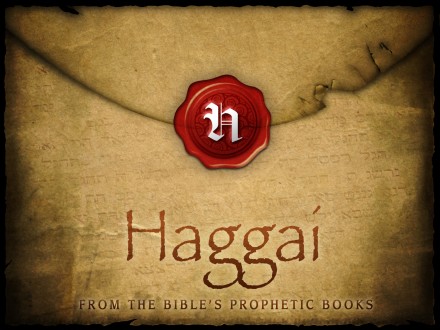
To understand the timeline of the Book of Haggai, please look at the following historical timeline (approx.) of when important “prophetic” events took place in relation to the Book of Haggai…
· 606 BC – the Lord’s Word thru His prophets (ex: Jeremiah, Isaiah, etc.) come to pass as a judgment on the “continual sins” of the Kingdom of Judah thru the FIRST Babylonian Invasion by Emperor Nebuchadnezzar-II
· 599 BC – the Lord’s Word thru His prophets (ex: Jeremiah, Isaiah, etc.) come to pass as a judgment on the “continual sins” of Kingdom of Judah thru the SECOND Babylonian Invasion by Emperor Nebuchadnezzar-II
· 586 BC – the Lord’s Word thru His prophets (ex: Jeremiah, Isaiah, etc.) come to pass as a judgment on the “continual sins” of Kingdom of Judah thru the THIRD and FINAL Babylonian Invasion by Emperor Nebuchadnezzar-II which results in the complete destruction of Jerusalem and Solomon’s Temple
· 536 BC –Jewish exiles (approx. 50,000) return to
· 534 BC –re-building of the Second Temple STOPS! (
· 520 BC –prophetic ministry of Haggai and Zechariah (
· 516 BC – the
· 458 BC – Ezra sent to establish the teaching of the Word and proper worship of God (
· 445 BC – Nehemiah sent to build the walls of protection around
In
Please read the following Scriptures in the order listed below to understand the historical background of what Haggai was facing and what he was addressing in his community…
1) Book of Jeremiah (Chapter 29) – Prophecy and Promise regarding the “Return of the Jews” from the Babylonian Captivity
2) Book of Isaiah (Chapters 44:21-45:7) – Prophecy regarding Cyrus the Great – Nearly 150 years before Cyrus was born, the prophet Isaiah foretold his birth, his name, and the tasks that the Creator God had predetermined for him to accomplish. The Bible records that certain people are foreordained to be born and carry out specific tasks for God during their lifetime and a few of these individuals are even named before their birth. Cyrus the Great was one of these individuals whom God had predestined to play a pivotal roll in his awesome plan for humanity. BTW, Cyrus actually reads this prophecy of Isaiah…he is amazed and moved to act on behalf of the Jews
3) Book of Daniel (Chapters 9 and 10) – Daniel’s fasting, prayer and intercession in response to the promise and prophecy in
4) Book of Ezra (Chapters 1, 2 and 3) – Cyrus the Great releases the Jews to go back to
5) Book of Ezra (Chapter 4) – Enemies of Judah oppose the rebuilding of the Temple and the plan of God…The people of God STOP working on God’s plan due to discouragement and disappointment! 534BC
6) Haggai (Chapter 1 and 2) – Sixteen years had passed since the Jewish people had laid the foundation of God’s house (
7) Ezra (Chapters 5 and 6) – The Lord brings about a GREAT victory (520BC-516BC) by His Spirit (
a) FEAR of the Lord-Awesome REVERENCE for His WORD (
b) OBEYING the Lord on His WORD (
Pastoral Word 4 us @ TSH
Our January 2013 TSH Sunday Sermons have focused on the Book of Haggai surrounding the theme, “Overcoming Discouragement.” The wave of discouragement comes to all of us in various ways and at various times. In counseling people I have found that the pathway to personal defeat is often paved with discouragement…and most times it appears to take the following steps…
1) Disappointment (when expectations are NOT met) leads to…
2) Discouragement… which leads to…
3) Disinterest… which leads to…
4) DEFEAT…
The more a person reads and studies the Bible, the clearer it becomes that in the history of His kingdom God chooses special people for special tasks. Or, to put it another way, the Lord always has the right person in the right place at the right time. The Prophet Haggai was a strategic figure in the history of God’s people -
The Book of Haggai (
Oppositions, disappointments and discouragement will certainly come to ALL of us! However, the Prophet Haggai tells us that the BLESSINGS and GRACE of God can NEVER be realized in our lives when we decide to follow our own personal-individualistic way of thinking, coping and living that is in direct OPPOSITION to what the Lord is saying by His Word and Spirit (
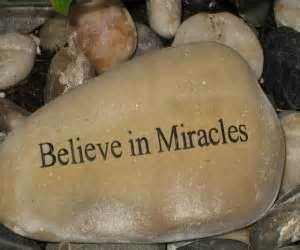 |
Once the Apostle Philip asked our Lord Jesus: "Lord, show us the Father, and it is enough for us (John 14:8)" Jesus replied to him, "Have I been with you so long, and you still do not know me, Philip? Whoever has seen me has seen the Father. How can you say, ‘Show us the Father’? Do you not believe that I am in the Father and the Father is in me? The words that I say to you I do not speak on my own authority, but the Father who dwells in me does his works. Believe me that I am in the Father and the Father is in me, or else believe on account of the works themselves (John 14:9-11)… The Miraculous works of our Lord Jesus Christ reveal the heart and hand of the Holy Trinity… the Father, Son and the Spirit…these miracles of Christ are a visible face of God to a suffering humanity…then and now! During the next FORTY DAYS, I encourage you to read about the FORTY MIRACLES of Jesus Christ outlined in this booklet… read ONE miracle per day for next forty days… Assess these matters in prayer and let the Spirit speak to your heart… |
"Consecrate yourselves today, for tomorrow the LORD will do wonders among you." (Joshua 3:5)…
PM @ TSHDownload These Tools for Fasting

"…do not be anxious about anything, but in everything by prayer and supplication with thanksgiving let your requests be made known to God. And the peace of God, which surpasses all understanding, will guard your hearts and your minds in Christ Jesus." Philippians 4:6-9
In the year 2013, the Lord is calling the family of TSH to a deeper place of prayer…to a place of compassion, commitment and change in Christ!
Prayer will change your private and public world…For example when Moses prayed for God to forgive the Israelites; God forgave them because God forgives (Exodus 32:11-14). But when he prayed that he, Moses, be allowed to cross the Jordan and enter the Promised Land, God did not grant him his request. He told him to stop praying. It was not going to happen however hard or long Moses prayed (Numbers 20:1-13; Deut 3:21-29). So prayer does not change God’s mind in any simple sense. Prayer changes the world because it changes us.
The Hebrew word for "to pray" islehitpallel ," which means "to judge yourself." That is what we do when we pray. We pray not simply for God to fulfill our desires but in order to know what to desire. All animals act to satisfy their personal desires. Only human beings are capable of standing back and really judging their desires. There are some desires we should not satisfy. Junk food is bad for us….So is smoking….So are many drugs…So is wealth illicitly obtained…So is ambition achieved by betraying others….And so on. To be humanly and spiritually mature is to know what to desire!
Prayer through the Word of God and Spirit of the Lord results in the education of our human desires. Take the weekday Hebrew Prayer "Amidah" as an example…this is the model of prayer which Jewish believers like Daniel (Dan 6) prayed THREE times a day (morning, afternoon and evening). The weekday Amidah contains nineteen blessings. Each blessing ends with the signature "Blessed are you, O Lord..." and the opening blessing begins with "Blessed are you, O Lord..." as well. The first three blessings as a section are known as the shevach ("praise"), and serve to inspire the worshipper and invoke God's mercy. The middle thirteen blessings compose thebakashah ("request"), with six personal requests, six communal requests, and a final request that God accept the prayers. The final three blessings, known as the hoda'ah ("gratitude"), thank God for the opportunity to serve the Lord. This was the model of prayer that the Apostle Paul was encouraging us to follow when he said in Philippians 4:6-9: "…do not be anxious about anything, but in everything by prayer and supplication with thanksgiving let your requests be made known to God. And the peace of God, which surpasses all understanding, will guard your hearts and your minds in Christ Jesus. Finally, brothers, whatever is true, whatever is honorable, whatever is just, whatever is pure, whatever is lovely, whatever is commendable, if there is any excellence, if there is anything worthy of praise, think about these things. What you have learned and received and heard and seen in me—practice these things, and the God of peace will be with you." Amidah Philippians 4:6-9), teaches us to seek knowledge, wisdom and understanding from our Lord – not just a new car, an exotic holiday or expensive clothes. It teaches us to want to return to God when, as it happens so often in our lives when we drift in the winds of time, blown this way and that by the pressures of today. It teaches us to seek spiritual healing as well as physical health. It teaches us to seek the best not just for ourselves but also for our people and ultimately for all humanity…This is what happened to Paul when he prayed three times.
Paul prayed thrice for his ``thorn in his flesh'' to be removed. Yet God did something different for Paul. The Lord replied: `My grace is sufficient for you, for My power is made perfect in weakness'' (2 Corinthians 12:9). When the Lord says, "NO," it is NOT rejection but it is re-direction! The Lord redirects our desires toward a new direction in life that changes our private and public world! True for Moses, true for the Apostle Paul, and true for you and me… To be humanly and spiritually mature is to be taught by the Word of God and the Spirit of God to know what to desire!
In Philippians 4:6-9, the Apostle Paul was encouraging us to pray based on the "spirit" of his Hebrew prayer model." In the Hebrew Birkot ha-shachar, the Dawn Blessings, prayer opens our eyes to the wonders of the physical world. It trains us to give thanks for the sheer gift of being alive. In the Hebrew Pesukei de-zimra, the Verses of Praise, we learn to see the Creator through creation. We sense the song of the earth in the wind that moves the trees, the clouds that dapple the sky, the sun that melts the snow. We hear God’s praise in the breath of all that lives. In the Hebrew Shema (Deut.6:4-9), the believer covers their eyes to move inward to the world of sound, to listen to the voice of God that we can only hear in the silence of the soul. And the word we hear is love – our love for God, His love for us. Then in the Amidah the believer stands in God’s presence, take three steps forward and bows. Lehavdil – This means people bowing down in the presence of a king or queen. You know you are in the presence of majesty when the Spirit of the Lord is present! Finally, Prayer teaches us to give thanks. That’s what the Apostle Paul experienced – for that matter any believer, any day is supposed to experience– when he or she begins the "Christ-centered Prayer of Philippians 4:6-10."
There’s a famous and fascinating piece of medical research known as theNuns’ Study. A group of nuns in America gave permission for their way of life to be studied in the interests of medical science. What the researchers found, comparing the nuns now with the brief autobiographies they had written sixty years before entering the order, is that those who at the age of twenty expressed the most gratitude lived longer and suffered fewer illnesses than their less thankful counterparts. Giving thanks – in Hebrew, Modim anachnu lakh – generates spiritual happiness which in turn helps physical health. Above all, prayer tells us we are not alone in the world.
When Natan (then Anatoly) Sharansky was imprisoned in the Soviet Union by the KGB, his wife Avital gave him a little Hebrew book of Psalms. The KGB sensed it would give him strength, so they confiscated it. He fought a three-year campaign to have it returned, and eventually it was returned to Sharansky. Natan Sharansky’s knowledge of Hebrew was very limited, but he was a brilliant mathematician, so he acted as if the book was written in a mathematical code he had to decipher. Slowly he decoded it, word by word, until he came to a complete sentence that came to him as a revelation, as if it had been spoken specifically to him there in the Russian prison. It was a line from Psalm 23: "Though I walk through the valley of the shadow of death I will fear no evil for You are with me." Many years later he took one of these phrases as the title of his autobiography: Fear no evil.
To pray is to know that "HE is with me." It is to know we are not alone. Rabbi Jonathan Sacks, the Chief Rabbi of the United Kingdom tells us that without a vessel to contain a blessing, there can be no blessing. If we have no receptacle to catch the rain, the rain may fall, but we will have none to drink. If we have no radio receiver, the sound waves will flow, but we will be unable to convert them into sound. God’s blessings flow continuously, but unless we make ourselves into a vessel for them, they will flow elsewhere. Prayer is the act of turning ourselves into a vehicle for the Divine. Prayer is to the soul what exercise is to the body. You can live without exercise but it will not be a healthy life. You can live without prayer, but whole areas of human experience will be closed to you. Prayer changes the world because it changes us, opening our eyes to the radiance of God’s world, our ears to the still small voice of God’s word.
Dear TSH family, in 2013 "PRAY WITHOUT CEASING" (1 Thessalonians 5:17)…it will change your world!
References:
- Jonathan Sacks (2011-09-19). Letters to the Next Generation 2: Reflections on Jewish Life (Kindle Locations 487-490). Office of the Chief Rabbi
 |
"And you, O Bethlehem, in the land of Judah, are by no means least among the rulers of Judah; for from you shall come a ruler who will shepherd my people Israel.’ " (Matthew 2:6) |
As I spend time in prayer for our congregation, I hear the voice of the Holy Spirit gently encouraging us all to COME BACK TO BETLEHEM. It is the Christmas Season – one of the high moments for the Church. It is about REMEMBERING the BIRTH of CHRIST. It is a time to respond in faith to the descent, death, resurrection and ascension of Christ Jesus. That is what this Christmas season is all about…it more than the giving and receiving, the commercials, candies and cards, etc.
How do we respond to the spirit of Christmas? We respond to the birth of Christ – by responding in hope, faith, and love shown by the Holy family in their journey toward Bethlehem. The Holy family (Joseph, Mary and Christ Jesus) show us that the faith of Abraham (the faith of a believer) is not an escape from the world, but an engagement with the world. Our faith does not anaesthetize us to the pains and apparent injustices of life. It does not reconcile us to suffering. It asks us to play our part in the most daunting undertaking ever asked by God of humankind: to construct relationships, communities, and ultimately a society, that will create a home for the Divine Presence (Bethlehem). And that means we will wrestle with God and with people refusing to give up or despair. No one exemplifies this condition more profoundly than Jacob (Genesis 32:28; 35:10). Abraham symbolizes faith as love. Isaac represents faith as fear, reverence, and awe. But Jacob lives faith as struggle.
Often Jacob’s life seems to be a matter of escaping one danger into another. He flees from his vengeful brother only to find himself at the mercy of deceptive Laban. He escapes from Laban only to encounter Esau marching to meet him with a force of four hundred men. He emerges from that meeting unscathed, only to be confronted with the rape of his daughter Dina and the conflict between Joseph and his other sons. Alone among the patriarchs, he dies in exile. Just like Jacob wrestles, we as descendants of Abraham (Galatians 3) – the children of Abraham – we continue to wrestle with the world. Yet just like Jacob who never gives up, and is never defeated; we are never to give up. Jacob is the man whose greatest spiritual experiences occur when he is alone, at night, and far from home. Jacob wrestles with the angel of destiny and inner conflict and says, "I will not let you go until you bless me." That is how Jacob rescues hope from catastrophe – as believers have always done. Their darkest nights have always been preludes to their most creative dawns. The birth of Christ at Bethlehem is a GREAT example of this victory of Jacob.
The path toward the birth of Christ was not easy. Just like their ancestor Jacob, Joseph and Mary toiled and walked through some very tough terrain to bring about the promise of God. They trudged through the Judean countryside in the ninth month of Mary’s pregnancy on a mule – just ask the moms in our congregation on how tough this is for the pregnant women… .On top of that, many in the Nazareth community misunderstood Mary for being pregnant before the marriage; Joseph was embarrassed; the family was perplexed, etc – I call this the scandal of grace! Many Nazarenes bad mouthed Mary – this virgin daughter of Israel (John 8:41). Joseph experienced financial and personal woes – the lack of money (Luke 2:24), the lack of proper housing during the birth (Luke 2:7), the losing of "face" in front of the community (the pregnant bride Matt.1:18), the lack of an intimate relationship with his wife until the promise was fulfilled (Matt 1:24-25), and his life is in the hands of some foreign invaders – the Romans (Luke 2:1-3). Despite all these obstacles, the holy family kept moving forward. It is a lesson for ALL of us in hope, faith and love!
The Scriptures show us that the promise of Bethlehem (Micah 5:2; Matthew 2:6) comes about through the grace of God, AND the faith and struggle of the children of Jacob – Joseph and Mary. The journey to Bethlehem, the place of promise was tiring; it got testy and it was tough! Birthing the promises of the Lord in our lives will oftentimes become very tiring, very testy and very tough. Precious Ones, I exhort you to KEEP MOVING WITH HIM. Keep your eyes on Jesus – the author and perfecter of your faith. Behind very breakdown there is always a breakthrough, and the Lord will turn your mess into a message of hope and your test into a testimony of triumph. So, be strong and of good courage (Joshua 1:8-9)!
To each precious family of the Shepherd’s House, I know the challenges and the craziness of your world. It is not easy to face our fears and wrestle with them, refusing to let go until we have turned them into renewed strength and blessing. But speaking personally, I would have it no other way. Life in Christ is not faith as illusion, seeing the world through rose-tinted lenses as we would wish it to be. It is faith as relentless honesty, seeing evil as evil and fighting it in the name of life, and good, and Christ. That is our vocation. Be of good cheer, the Lord has overcome it for you (John 16:33).
My pastoral word to you in this season is to participate in the "Blessings of Bethlehem" during this Christmas 2012 Season.
The Lord has called you to something more than the merely celebrate this blessed season – He has called you to "PARTICIPATE" in it. He is calling you to come back to Bethlehem, and to follow the ancient pathway of faith and victory paved for us by Abraham, Isaac, Jacob, Joseph, Mary and Yeshua. This Christmas Season come "Back to Bethlehem re-energized in His Presence so as to receive the promises of your Lord, to recite His promises, and respond to those promises in your lives. It remains a privilege to carry our Lord’s destiny through the blessings of Bethlehem – the House of Hope.
Reference:
- Sacks, Rabbi Sir Jonathan (2010-07-31). Genesis: The Book of Beginnings (Covenant & Conversation) (Kindle Locations 4085-4087). Kindle Edition.
The LORD spoke to Moses, saying, “Speak to the people of Israel and say to them, These are the appointed feasts of the LORD that you shall proclaim as holy convocations; they are my appointed feasts.(Leviticus 23:1-2)

The roots of Christianity run deep in the soil of Israel. However, many Christians are unaware of about their rich Hebrew heritage. During this Hanukkah season, I would like us to take some time and reflect on some of what the Lord tries to communicate with His people regarding His festivals in Leviticus 23. The Jewish festivals are all stories of HOPE. The Feast of Passover tells us that a people enslaved, powerless and without rights can win their freedom with God’s help. The Feast of Pentecost tells us that a people unloved by their contemporaries can become the covenantal partner of God himself. The Feast Tabernacles tell us that even a homeless nation, living in temporary dwellings, is still on a journey with God to the Promised Land. The New Year (Rosh Shanna) and Day of Atonement (Yom Kippur) are festivals of a different kind of hope. The three pilgrimage festivals are about the community of God, its history and its future in-CHRIST.
These celebrations tell us that we are not prisoners of our past. We are not condemned forever to be haunted by the wrong we once did. We can repent and be forgiven; we can begin again. The Jewish priestly service on these holy days contains a line that in itself is the most explicit rejection of an individual’s fate in the Western-Philosophical sense. The Greek Delphic
oracle told of decrees that could not be averted, however hard people tried. BUT on the high holy days Judaism says to the contrary, ‘Penitence, prayer and charity avert the evil decree.’ In Judaism there is no such thing as a decree that cannot be averted (Book of Jonah). Therefore there is no future that is bereft of hope.
The social legislation of Judaism is a minutely articulated set of instructions for building a society of hope. No one is to be allowed to be destitute. The produce of the field and the wealth of the town must be shared. No one is condemned to a lifetime of slavery. One day in seven, all are free. No one is to be indebted forever. Every seven years, all debts are cancelled. No one is forced to sell his or her ancestral inheritance in such a way as to rob their children or grandchildren of their heritage. In the jubilee year, land returns to its original owners. The entire legislative structure is aimed at creating a CULTURE OF HOPE! Even Judaism’s ritual laws are based on this principle. Tzitzit, the command to make fringes with a thread of blue on the corners of garments, appears in the Bible immediately after the episode of the spies in which the people lost hope of inheriting the land. The cord of blue was to remind Jews of heaven, and the knowledge that in fighting their battles they were not alone.
Hanukkah is such a festival… sundown December-8-2012 marked the start of Hanukkah for this year. Our Lord Jesus Christ celebrated this awesome Jewish Feast: “And it was at Jerusalem the feast of the dedication (Hanukkah), and it was winter. And Jesus walked in the temple in Solomon’s porch.” John 10:22-23. The word for dedication used in John 10:22 literally mean “renewal”, or “re-dedication”. The Hebrew word for rededication is “hanaka”. Interestingly, the Greek word is “anakaino”, which sounds like Hanukkah if you think about it. The meaning of Hanukkah is something we all can apply to our lives. Here’s a quick synopsis of the historical background of Hanukkah:
In 168 B.C.E. the Jewish Temple was seized by Syrian-Greek soldiers and dedicated to the worship of the god Zeus. This upset the Jewish people, but many were afraid to fight back for fear of reprisals. Then in 167 B.C.E. the Syrian-Greek emperor Antiochus made the observance of Judaism an offense punishable by death. He also ordered all Jews to worship Greek gods. He slew forty thousand inhabitants of Jerusalem, and sold forty thousand more as slaves. In addition to this, he sacrificed a pig on the altar of burnt-offerings, and a broth being made of this, he sprinkled it all over the temple. He desecrated the temple!
Jewish resistance began in the village of Modiin, near Jerusalem. Greek soldiers forcibly gathered the Jewish villages and told them to bow down to an idol, and then eat the flesh of a pig – both practices that are forbidden to Jews. A Greek officer ordered Mattathias, a High Priest, to acquiesce to their demands, but Mattathias refused. When another villager stepped forward and offered to cooperate on Mattathias' behalf, the High Priest became outraged. He drew his sword and killed the villager, then turned on the Greek officer and killed him too. His five sons and the other villagers then attacked the remaining soldiers, killing all of them.
Mattathias and his family went into hiding in the mountains, where other Jews wishing to fight against the Greeks joined them. Eventually they succeeded in retaking their land from the Greeks. These rebels became known as the Maccabees, or Hasmoneans. The city and temple were recovered three years afterward by Judah Maccabaeus (Son of the High Priest Mattathias), and the temple was purified with great pomp and solemnity. The ceremony of purification continued through eight days, during which Judah Maccabees celebrated the praise of God with hymns and psalms (Josephus, Ant., b. xii. ch. 11). “They decked, also, the forefront of the temple with crowns of gold and with shields, and the gates and chambers they renewed and hanged doors upon them,” 1 Mac. iv. 52-59. On this account it was called the feast of renovation or dedication. Josephus calls it the Feast of Lights, because the city was illuminated, as expressive of joy. The feast began on the twenty-fifth day of Chisleu, answering to the fifteenth day of December. The festival continued for eight days, with continued demonstrations of joy.
Jewish tradition tells us that the Jews were determined to purify the Temple by burning ritually pure oil in the Temple’s menorah for eight days. But to their dismay, they discovered that there was only one day's worth of ritually pure oil left in the Temple. They lit the menorah anyway, and to their surprise the small amount of oil lasted the full eight days.
This is the miracle of the Hanukkah oil that is celebrated every year when Jews light a special menorah known as a Hanukkiyah for eight days. One candle is lit on the first night of Hanukkah, two on the second, and so on, until eight candles are lit.
Hanukkah is the re-dedication of the Temple for God’s people. Hanukkah conveys the struggle that the people of God have had in this world, and celebrates their victory against stronger foes – victories only God Himself can secure. It is a holiday commemorating God’s care of His people. For the Christian, it is helpful to understand these Jewish roots of our faith. Of course, we are no more required to celebrate Hanukkah than we are any other holiday. Nevertheless, the significance of Hanukkah is in the great reminder of Christ:
- The menorah in the Temple had seven branches for candles. But, the Menorah used in Hanukkah has nine branches. It is called Hanukkiyah. Why NINE? Because the central candle (the Shamash – “Servant Candle”) is used to light the other eight. All the eight candles of Hanukkiyah must be in a straight line while Shamash (the 'servant candle') should be out of alignment with the other candles and should be positioned at the middle of the candelabrum, positioned slightly higher than the rest of the candles. Jesus Christ, the One who is seated on-high with the Father (Eph.1) is that Servant Light (John 1), and He has come to light every person’s soul who is born into this world. You have His Light available for you!
- 2. In the midst of so much chaos, the light burned in the Temple for eight days. But the light we have in Jesus Christ will never go out. It doesn’t come from us, it comes from God. Sometimes we have things in our lives that try to hinder that light. But this Hanukkah, whether you celebrate or not, please be reminded of God’s faithfulness to us, and in return, let us rededicate ourselves to be faithful to Him. Don’t let your light be dim! LET IT SHINE IN THIS WORLD…
References:
• Sacks, Jonathan (2010-03-31). Future Tense: Jews, Judaism, and Israel in the Twenty-first Century (pp. 247-248). Random House, Inc.. Kindle Edition.
• http://biblicism.wordpress.com/2008/12/17/the-significance-of-hanukkah/
• http://judaism.about.com/od/holidays/a/hanukkah.htm
• http://www.hanukkahcelebrations.com/candles.html
Angry with God?
by Pastor Mohan Unni | December 5, 2012
 “She was deeply distressed and prayed to the LORD and wept bitterly.” (1 Samuel 1:20)
“She was deeply distressed and prayed to the LORD and wept bitterly.” (1 Samuel 1:20)
Barrenness in the Bible is an image of lifelessness, where God’s redemptive blessing is absent. When Adam and Eve sinned, it brought about a curse on the fruitfulness of God’s creation. The soil of the earth thereafter produced thorns and thistles, requiring painful toil to yield food. Human fertility was cursed as childbearing became a painful and life-threatening event (Genesis 3). In the Bible fruitful land and fertile women are always images of the blessedness of life as God had originally intended it. The opposite of these, desolate land and barren women, are biblical images of the consequences of sin. The image of the barren wife is one of the Bible’s strongest images of desolation and rejection. We find this first in Genesis, where the examples include Sarah (Gen.11:30), Rebekah (Gen.25:21) and Rachel (Gen.29:31). The classic case of barrenness in the OT is Hannah (1 Sam 1), and a corresponding NT example is Elizabeth (Luke 1).
In this Text (1 Samuel 1:20), we find Hannah bitter, angry and deeply distressed! Hannah faced a problem, and it is a problem that can’t find any answers in the human dimension… The literal translation of the Hebrew language says that the LORD had closed her womb (1 Sam.1:5-6). This is figurative language meaning that God “had kept her from having children” or “had not granted her children” Some languages will prefer a more technical term, saying that the LORD had made her “barren.” Now, I ask you this question: “How would you feel if year after year after year the Lord kept you in a barren state for some reason that is beyond your human comprehension?” Think about it…maybe you are facing such an issue now…In this Text Message I would like us to explore a particular struggle that good people have with God: “Is it permissible for a godly person to be angry with God?
Let’s explore this by looking at the 1 Samuel 1:20 text…We see Hannah’s outburst to frustration at things that didn’t work out in her life…Rabbinic literature tells us that Hannah is the only woman whose prayer to God is recorded in the Bible! Hence, one would expect the male chauvinistic rabbis to seize on her prayer as the definitive instance of how women but not men should pray. The rabbis do no such thing. Instead, they use her prayer to teach how all people, male and female, should pray. Despite their marked gender consciousness, the rabbis never once comment on the fact that Hannah is female when discussing her heart-rending prayer. They seem to look past Hannah's gender to her humanity to emphasize that in personal prayer there is only a human trying to communicate with God with her heart, soul and mind (Deut.6:5)
Moses also had frequent outbursts of frustration and anger in his life and ministry (Deut.1:9). Regarding Moses’ outburst of frustration, Professor Aviva Zornberg of Jerusalem provides an interesting perspective on the matter… She suggests that Moses complains about God and expresses anger at God to give the Israelites permission, through his example, to express their anger through prayer to God. And they do, immediately—complaining about conditions in the wilderness, accusing God of hating them for subjecting them to forty years of wandering. And then, Zornberg points out that we find something else in the Torah which we have never seen before: “You shall love the Eternal our God with all your heart …” (Deuteronomy 6:5). You see…before the Deut 6:5 text, the children of God were commanded to obey God, to honor God, to follow God’s ways, but never before have they’ve been told to love God, because you can’t love someone wholeheartedly, “with all your heart,” if you are afraid to be angry with him or her. You will be censoring your emotions. There will be a measure of pretense, of concealment verging on dishonesty in the relationship. Being angry with someone is an inevitable dimension of caring about that person you love, caring about what he or she does and how he or she feels about you.
Even our Lord Jesus Christ faced the pain of frustration…just like Hannah…Hebrews 5:7 tell us: “In the days of his flesh, Jesus offered up prayers and supplications, with loud cries and tears, to him who was able to save him from death, and he was heard because of his reverence. Although he was a son, he learned obedience through what he suffered” Christ was the Son of the Father, and it was in the very struggle of obedience through the frustrations, anxiety, anger and pain in the desert, Gethsemane, betrayals, and the Cross that the identity of the Son was verified, validated and perfected! This was what made Christ the beloved Son (Philippians 2:5-11) – the example for us to follow and embody!
I have seen many people being angry with God because of problems that inflict humanity— unanswered prayers, lack, broken dreams, incurable illnesses, famine, flood, etc. The wrong people seem to be blessed with more money, more talent, better looks, etc, etc. Life is not fair, and we wonder why God doesn’t do something about it. Hannah’s example can teach us a valuable lesson that being angry and disappointed with someone does not need to fracture a relationship. Anger is a normal part of an honest relationship. We can be angry at our parents or at our friends and still love them…hey, we can be angry with God because we don’t understand some things, and still turn to Him for guidance and comfort and to express our gratitude for all the blessings we do have in our lives. It is all part of growing up in the Holy Spirit!
“Blessed be the Lord! For he has heard the voice of my pleas for mercy. The Lord is my strength and my shield; in him my heart trusts, and I am helped; my heart exults, and with my song I give thanks to him.”( Psalm 28:6-7)
References:
- Omanson, R. L., & Ellington, J. (2001). A handbook on the first book of Samuel. UBS Handbook Series (29). New York: United Bible Societies.
- Ryken, L., Wilhoit, J., Longman, T., Duriez, C., Penney, D., & Reid, D. G. (2000). Dictionary of biblical imagery (electronic ed.) (75). Downers Grove, IL: InterVarsity Press.
- Salkin, Edited by Rabbi Jeffrey K. (2012-04-20). Text Messages: A Torah Commentary for Teens (Kindle Locations 4199-4221). Jewish Lights Publishing. Kindle Edition.
- http://www.bibleandjewishstudies.net/articles/hannah.htm
| << Previous 1 - 2 - 3 - 4 - 5 - 6 - 7 Next >> |

